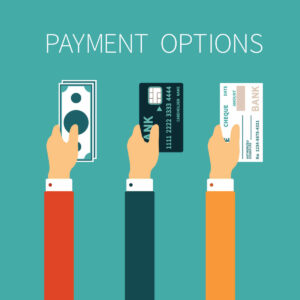Even with today’s technology, like mobile wallets, using cash is still a popular way to pay.
Each week, Consolidated Credit searches for financial research that can help you deal with your debt and budget. This week…
The interesting study

Every year, at least one finance company asks consumers about their preferred payment methods. Last year, we learned cash is still king for small purchases from CreditCards.com. This year, the financial experts at Blumberg Capital find cash continues to hang on despite all the tech-based options for payment.
The big result
The study revealed that nearly 60% of Americans still use physical cash to make purchases at least once each week. That means in spite of innovations like mobile wallets, consumers don’t seem to be willing to give up their cash anytime soon.
The fascinating details
The survey includes more payment method statistics:
- Online payment technologies like ApplePay and PayPal aren’t taking over yet; only 21% of survey takers use these methods at least once per month.
- Only 9% of American consumers make online purchases at least once per month
- 38% of U.S. consumers use a mobile banking app at least once a month
- However, only 18% use their mobile wallet during the same time
- 6% of consumers admit to using alternative financial services (AFS), such as payday loans
Part of the reason these technologies are slow to catch on may be cybersecurity concerns. Almost 40% of survey respondents said they worried that online financial transactions lead to fraud.
Interestingly enough, consumers have an easier time accepting these technologies elsewhere in the world than we do here:
- Israeli consumers use mobile banking the most – 50% use it regularly
- They’re also more likely to use mobile wallets (27% do so at least once a month)
- At 9%, U.S. consumers are the least likely to make purchases online:
- 13% usage rate in the U.K.
- 14% in Germany
- At 6%, Americans use AFS like payday loans about as much as the rest of the world:
- 7% usage rate in Israel
- 5% in Germany
What you can do
There are a number of concerns that matter when you talk about which payment method is the best one to use. Cash is beneficial if you have a history of debt problems because you only spend what you have. However, you don’t have an electronic record of your transaction; this can make it harder to budget.
By contrast, mobile payment and online banking systems make it much easier to budget. Many banks and credit unions already offer customers a complimentary personal financial management (PFM) tool. These tools help make budgeting and categorizing your expenses automatic.
On the other hand, mobile and online banking technologies elevate risks for both overspending and identity theft. You can drain your PayPal account before you realize it if you don’t monitor the balance closely. Mobile wallets make it all too easy to add debt each time you charge. In both cases, smart cybercriminals can gain access to your accounts and your funds.
So, what you do depends on how you like to pay:
- If you prefer cash transactions…
- If you use an online banking or budgeting tool, make sure to enter cash transactions in manually. Most programs give you the option to do this, so you can track incidental spending.
- If you ever decide to upgrade, online payment technologies like PayPal may be a good choice. They give you the same benefit of avoiding debt that cash does, but limiting spending only to the money you have.
- If you prefer mobile technologies…
- Your primary concern should be identity theft. Make sure to check the monthly statements for each account carefully. Smart cyber thieves can also make small transactions with the idea that you won’t notice it if they don’t drain your balance completely.
- Also, be careful with debt. If you have credit cards saved in your mobile wallet, monitor spending carefully to ensure you don’t run up balances.